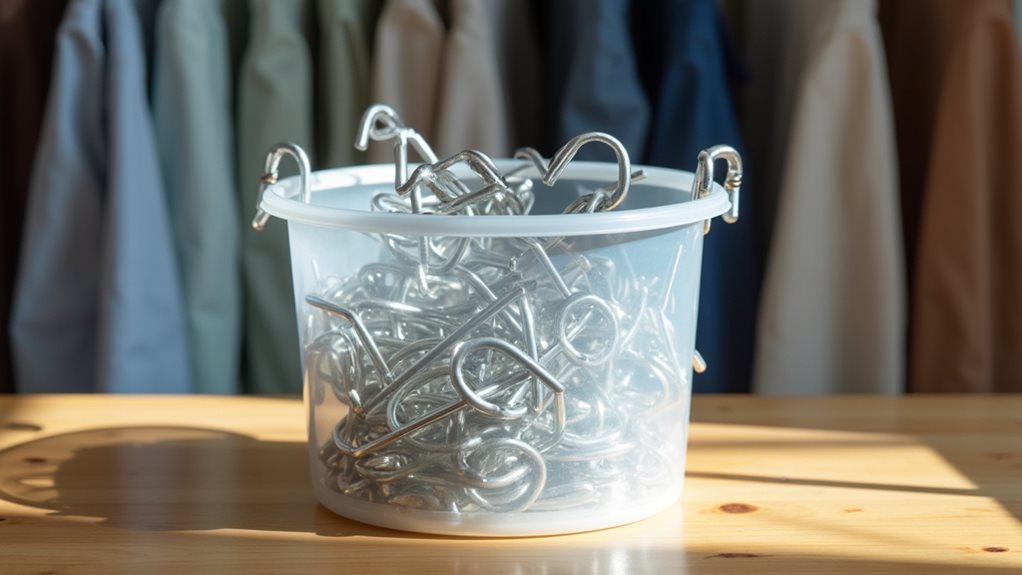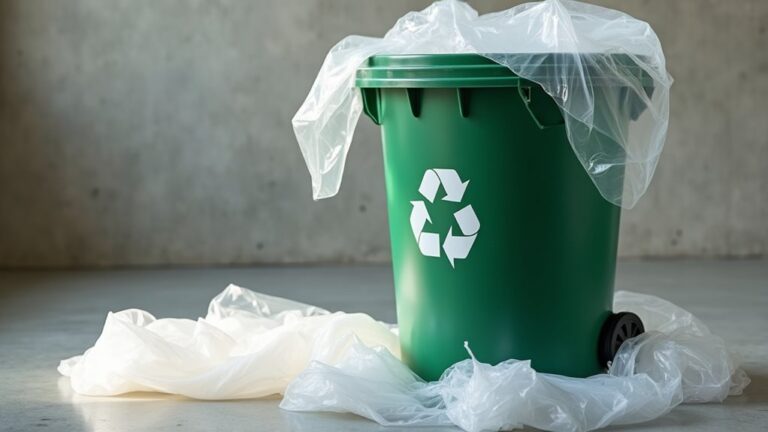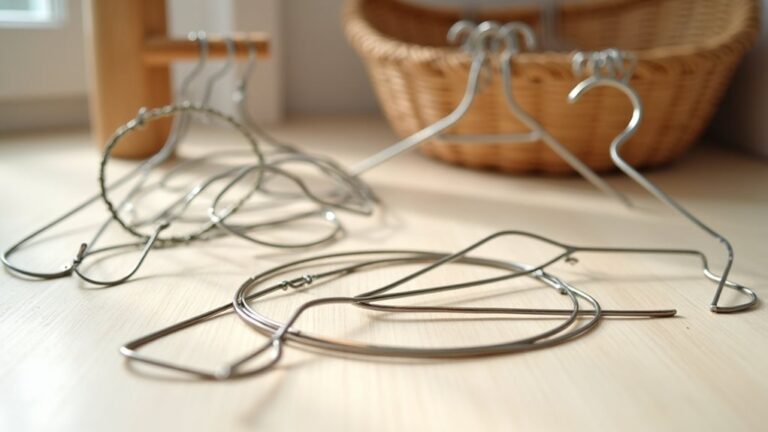You can definitely recycle wire dry cleaning hangers, though they’re not welcome in most curbside bins since they love jamming sorting machinery—trust me, I’ve learned this the hard way! Your best bet is returning them directly to your dry cleaner, who’ll often gladly take them back for reuse, or dropping them off at scrap metal recyclers who accept steel materials. There are several other creative solutions worth exploring too.
Understanding Wire Hanger Materials and Recycling Potential
The mystery of wire hangers always fascinated me, especially after I discovered that my weekly dry cleaning trips were contributing to a massive environmental problem I’d never considered before.
You see, those seemingly innocent wire hangers are actually made from steel, which is totally recyclable – but here’s the catch that’ll make you shake your head 🤦♀️. Most curbside programs won’t touch them because they jam up sorting machinery, creating expensive headaches for recycling facilities.
The good news? You’ve got options for proper metal disposal through local recycling centers and scrap yards that’ll gladly accept your wire hangers.
Local recycling centers and scrap yards welcome your wire hangers when curbside pickup won’t – giving those steel hangers the second life they deserve.
While you’re at it, don’t forget to properly handle those protective plastic film coverings that come with your garments, as they require special drop-off locations rather than standard recycling bins.
Understanding these materials empowers you to make smarter choices and break the cycle of sending perfectly recyclable steel straight to landfills.
Curbside Recycling Programs for Metal Hangers
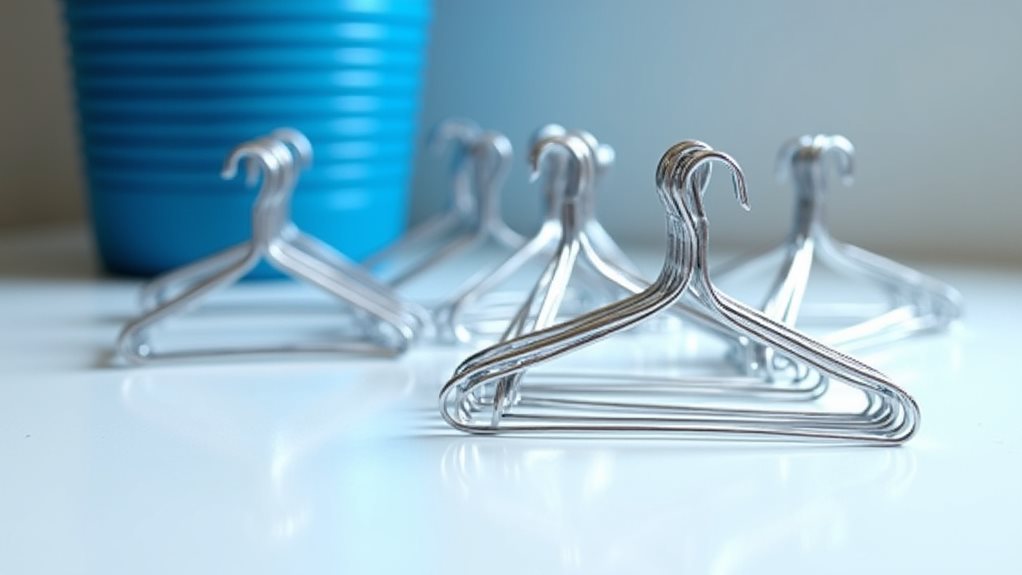
Although I spent years dutifully tossing my wire hangers into that blue bin with complete confidence, I eventually learned the hard truth that most curbside recycling programs treat these metal mysteries like unwanted party guests.
These seemingly innocent metal hangers actually wreak havoc on sorting machinery, tangling up equipment faster than Christmas lights in storage. While some lucky areas like Montgomery County welcome wire hangers in curbside recycling, you’ll need to check your local guidelines because rules vary dramatically by location.
Don’t expect compensation either – this is purely about doing right by the planet. If your municipality doesn’t accept them curbside, consider returning hangers to your local dry cleaner, where they’ll gladly reuse them or send them to scrap metal dealers.
Dry Cleaner Take-Back Programs and Return Options
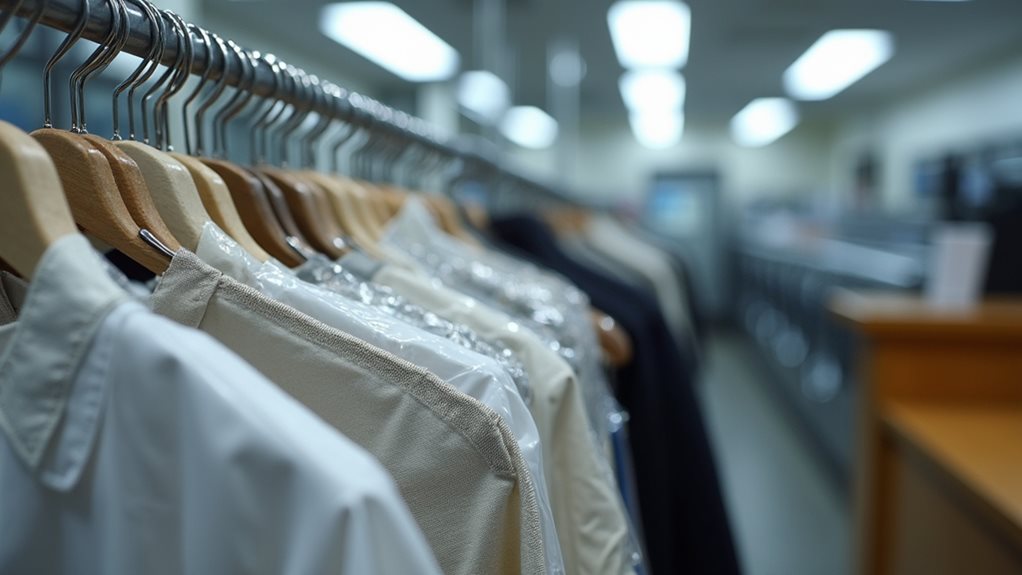
When you’re standing in your closet wondering what to do with that growing pile of wire hangers, you’ll be relieved to know that many dry cleaners actually want them back through organized take-back programs.
I learned this the hard way after hoarding hangers for months, thinking I was being environmentally responsible, only to discover my local cleaner had been accepting returns all along and even participates in the Drycleaning & Laundry Institute’s recycling program.
The process is surprisingly straightforward once you understand which establishments participate and how their specific return systems work, though you’ll want to call ahead since policies vary from shop to shop.
This take-back approach is particularly important because the thin wire construction of these hangers can jam sorting machinery at standard recycling facilities, making traditional curbside recycling programs unable to process them safely.
Participating Dry Cleaner Programs
Collaboration between environmentally conscious dry cleaners and their customers has created one of the simplest, most effective recycling solutions you’ll find hiding in plain sight.
These participating retail locations have transformed wire hangers from household clutter into valuable resources through well-organized recycling programs. When you walk into establishments that prioritize sustainability, you’ll often notice collection bins near the counter, clearly marked for hanger returns.
I’ve discovered that these forward-thinking businesses frequently partner with local scrap metal facilities, guaranteeing your returned hangers actually get processed rather than ending up in landfills.
The beauty of these programs lies in their convenience—you’re already visiting for cleaning services, so dropping off accumulated hangers becomes effortless. Many of these same establishments also accept other dry cleaning materials for recycling, including the thin plastic bags that protect your garments, which can be bundled with plastic film recycling programs at participating locations.
It’s honestly invigorating to see businesses making environmental responsibility this accessible!
Hanger Return Process
The actual return process couldn’t be more straightforward, though I’ll admit I was initially uncertain about the proper etiquette when I first approached my local cleaner with a bundle of accumulated hangers.
You simply walk in during regular business hours, explain that you’d like to return hangers for recycling, and hand them over to the staff member at the counter. Most dry cleaners will gladly accept them, often expressing genuine appreciation for your environmental consciousness.
I’ve found that bundling hangers in groups of ten makes the handoff effortless and shows you’ve put thought into the process. The entire interaction typically takes less than two minutes, and you’ll leave knowing you’ve contributed to reducing waste while supporting local recycling initiatives.
If you’re unsure about your local dry cleaner’s specific hanger return policy, you can always call ahead using their listed phone number to confirm they participate in take-back programs.
Special Recycling Centers and Scrap Metal Facilities
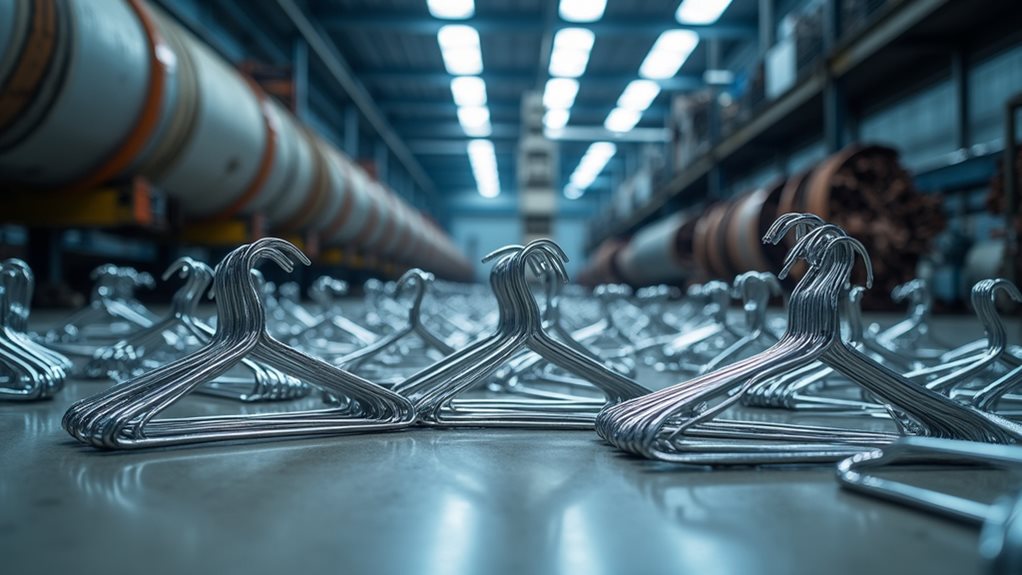
If your local dry cleaner doesn’t take hangers back, you’ll want to explore scrap metal recyclers in your area, since these facilities typically welcome wire hangers as part of their steel collection efforts.
I’ve learned the hard way that calling ahead saves you a frustrating trip, because some recycling centers have specific requirements about quantities or won’t accept hangers that are bent beyond recognition 😅.
You might be surprised to discover that certain special recycling programs exist specifically for items like wire hangers, offering convenient drop-off options that make responsible disposal much easier than you’d expect.
Scrap Metal Recycler Options
Where can you take those wire hangers when your dry cleaner’s already drowning in returns and your regular recycling bin won’t accept them?
Your local scrap metal recyclers are surprisingly welcoming to these twisted metal survivors, and they’re often accepted for recycling alongside copper pipes and aluminum cans.
I’ll admit, my first visit to a scrap yard felt intimidating—like I was intruding on some industrial secret—but the staff were genuinely helpful about their requirements.
Some facilities want hangers straightened out, others don’t mind if they’re still shaped like question marks from your closet adventures.
Before loading up your car, call ahead to check their specific guidelines.
Bonus: some recyclers actually pay for wire hangers, turning your decluttering session into unexpected coffee money! ☕
If you’re looking to reduce trips to the recycler, consider picking up dry cleaning sheets for your dryer, which can help you handle some garments at home without generating more wire hangers.
Special Program Requirements
While scrap metal facilities welcome your hangers with open arms, specialized recycling centers often come with their own set of quirky requirements that can feel like maneuvering through a bureaucratic maze designed by someone who really, really cares about proper metal sorting.
You’ll need to check with your local recycling centers because each facility operates differently – some accept wire hangers bundled together, while others demand they’re completely straightened (trust me, I’ve spent embarrassing amounts of time wrestling with stubborn hangers 😅).
Many centers require advance notice or specific drop-off days for metal items, and some won’t accept wire hangers at all due to equipment complications.
The Drycleaning & Laundry Institute provides helpful guidelines, but honestly, calling ahead saves you the frustration of showing up with rejected hangers.
Since many dry cleaners serve essential workers like healthcare professionals and first responders, they often generate substantial quantities of hangers that require proper disposal channels.
Creative Reuse Ideas for Wire Hangers Around the Home
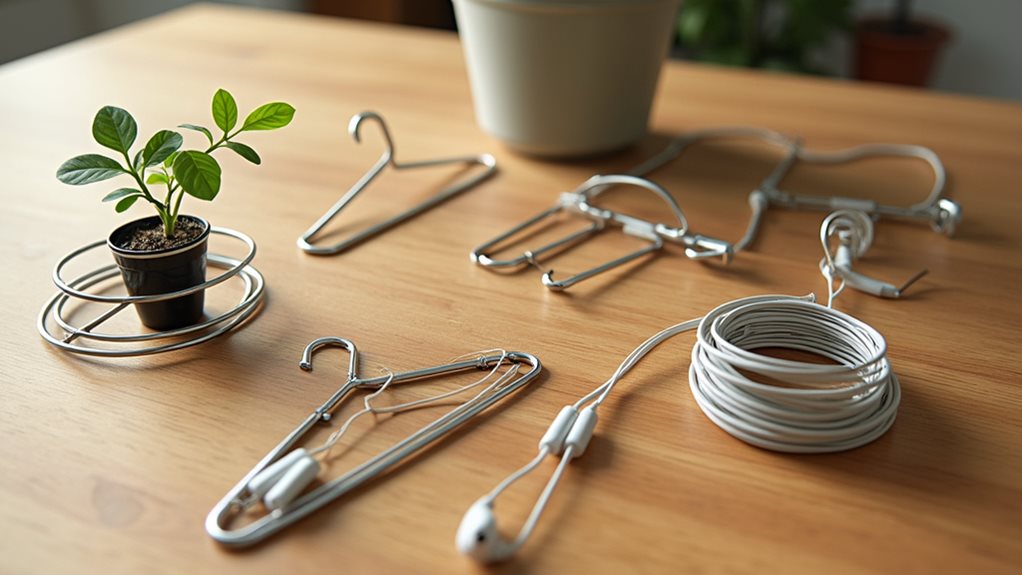
Before you toss those wire hangers into the recycling bin, consider the surprising versatility they offer as household problem-solvers and organizers throughout your home.
Wire hangers deserve a second life as clever household tools before heading to the recycling bin.
I’ve discovered that creative reuse transforms these simple items into surprisingly effective tools. You can bend them into spiral jewelry organizers, creating custom storage that keeps necklaces tangle-free and earrings visible.
Straighten and reshape them into picture frame stands for displaying photos on shelves or desks. They make excellent plant supports, especially for droopy houseplants that need gentle guidance.
Mount bent hangers on walls as makeshift coat racks for entryways. When drains clog with hair, a straightened hanger becomes your practical solution for fishing out debris, saving expensive plumber visits while solving problems creatively.
You can also fashion them into paint can holders that provide steady grip when working on home improvement projects, or bend them into chip bag clips that seal open packages more effectively than traditional closures.
Environmental Impact of Proper Hanger Disposal
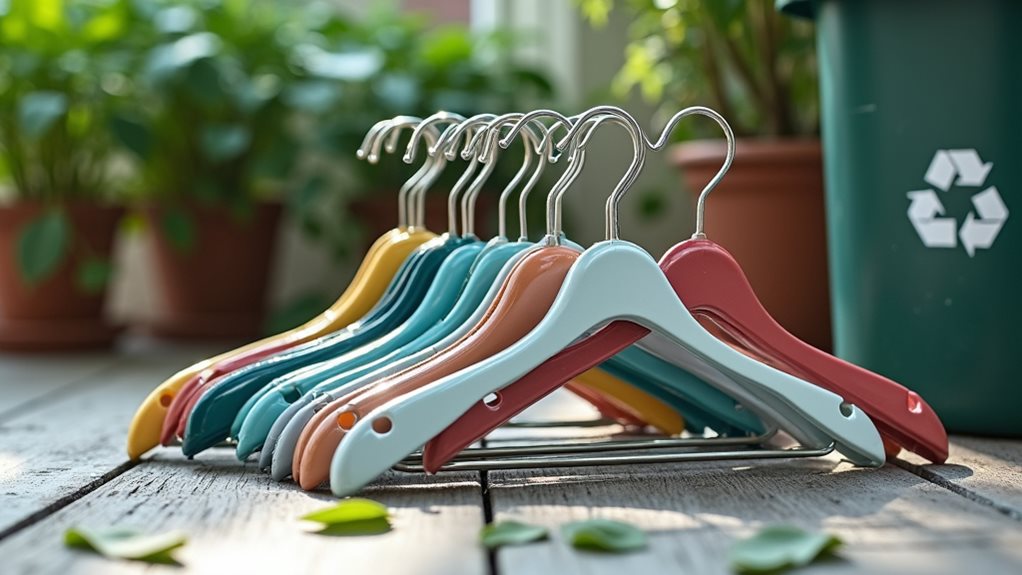
Beyond these clever household hacks, I’ve learned that the way you dispose of wire hangers carries surprising weight for our planet’s health, and honestly, I used to be completely clueless about this environmental domino effect.
When millions of wire hangers hit landfills annually, we’re fundamentally burying perfectly recyclable metal that could’ve lived another life.
Here’s what blew my mind: returning hangers to your dry cleaner isn’t just convenient—it’s environmental sustainability in action, since many shops have reuse programs that keep these items circulating.
The real kicker? Most curbside recycling options won’t accept wire hangers because they jam sorting machines, but recycling the metal saves energy and slashes greenhouse gas emissions compared to manufacturing new materials. 🌍
Similarly, while you’re being environmentally conscious with hangers, don’t forget that dry cleaning bags should be recycled through plastic film recycling programs at grocery stores and retailers rather than tossed in regular household bins.
Alternative Recycling Solutions When Standard Options Aren’t Available
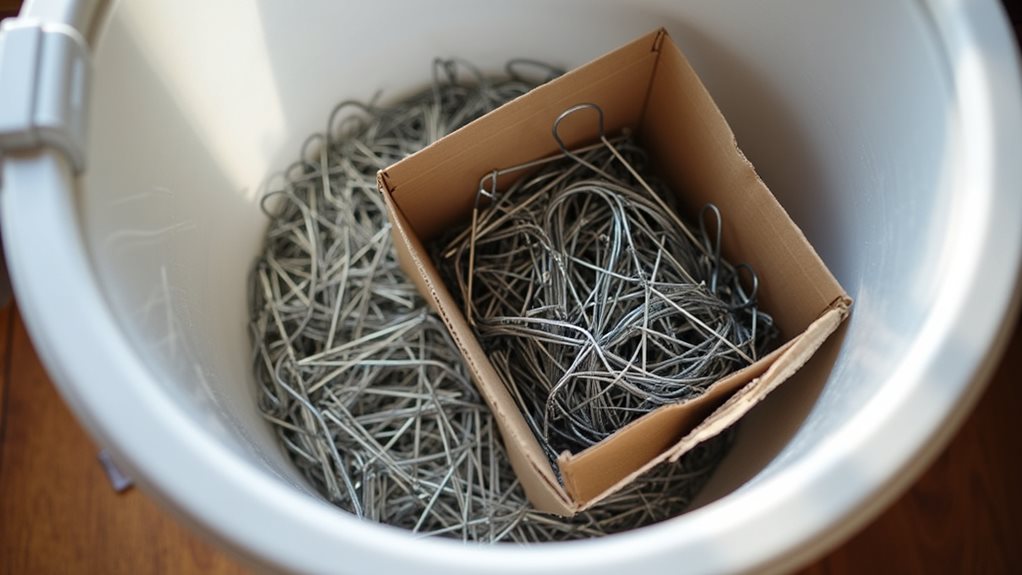
When your local curbside program gives you the cold shoulder and your nearest dry cleaner just closed down permanently, you’ll need to channel your inner detective to uncover hidden recycling gems in your community.
Start by calling scrap metal recyclers directly – they often accept wire hangers when standard recycling programs won’t touch them.
Scrap metal recyclers frequently welcome wire hangers that traditional curbside programs reject outright.
I’ve discovered that community centers sometimes coordinate special collection events, and local Facebook groups can be goldmines for sustainability efforts information.
Don’t overlook art teachers or craft enthusiasts who might repurpose your hangers for creative projects. Some auto shops use them for small repairs, and theater groups love them for costume storage.
These alternative recycling programs require more legwork than tossing items curbside, but they’re surprisingly rewarding once you’ve built those connections.
As you explore these options, consider that many modern dry cleaners are transitioning to eco-friendly solvents and sustainable practices, making them potential partners in your recycling efforts.

